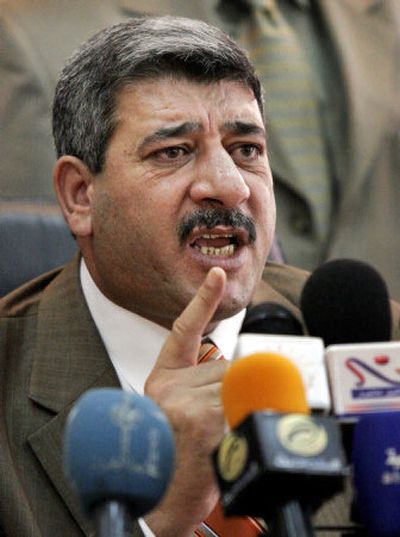Sunni Iraqi minister wounded

BAGHDAD, Iraq – One of Iraq’s deputy prime ministers was seriously wounded Friday in a bombing that highlighted the ability of insurgents to breach heightened security in the midst of a U.S.-led crackdown in Baghdad.
The attack against Salam al-Zubaie, one of the highest-ranking Sunni Arabs in the Shiite-led government, killed at least six people and injured 15 others as they were preparing for a prayer service at al-Zubaie’s home, Brig. Qassim al-Moussawi, spokesman for the Baghdad security plan, said at a news conference. The attack involved two simultaneous blasts: a suicide bombing in the house and a car bomb detonated in a garage attached to the house.
Al-Zubaie, whose lungs and stomach were punctured by shrapnel, underwent surgery at Ibn Sina military hospital in the Green Zone, officials said. He was in stable condition Friday afternoon, according to a statement issued by Prime Minister Nouri al-Maliki.
The Islamic State of Iraq, a Sunni insurgent umbrella network that includes al-Qaida in Iraq, asserted responsibility for the attack in an Internet statement, saying al-Zubaie was a “betrayer” for joining the government.
The authenticity of the statement could not be confirmed.
A top aide to al-Zubaie said the suicide bomber was sneaked onto the property over a back fence by one of al-Zubaie’s cooks. The cook briefly hid the bomber between the fence and blast walls, then snuck the attacker inside when security guards went to pray, said the aide, who spoke on condition of anonymity because he fears retaliation. The car that was bombed belonged to the cook, who escaped and remains at large, the aide said.
Al-Zubaie, one of two deputy prime ministers, is a member of the Iraqi Islamic Party, part of the main Sunni bloc in the Shiite-led parliament. In 2005, the party joined other Sunni organizations in urging Iraqis to vote against a proposed new constitution in 2005, before switching gears and announcing its support of the charter.
Sunni insurgents have appeared to assert themselves recently by meting out deadly attacks on Sunnis who have cooperated with Americans or the Iraqi government.
In the past two weeks, Sunni insurgents bombed five police stations in the majority-Sunni town of Duluiyah, 45 miles north of Baghdad. Last week, insurgents bombed an Iraqi army observation post in the Anbar province town of Ramadi, the heart of the Sunni insurgency.
Dafir al-Ani, a member of parliament from the Iraqi Islamic Party, said the attack against al-Zubaie showed violence remained a major obstacle in the path to political stability.
“They are developing ways to beat the measures of the security plan,” he said of Sunni insurgents. “All of us are targeted. And terrorists can get into bedrooms.”
Al-Zubaie’s house, just outside the Green Zone, is inside a secure compound that encompasses many news agencies and the homes of other Iraqi political leaders. The attack followed by a day a rocket attack that shook the hall where al-Maliki was holding a news conference with U.N. Secretary General Ban Ki-moon. Last month, Iraq’s Shiite vice president was wounded in an explosion inside the Ministry of Public Works.